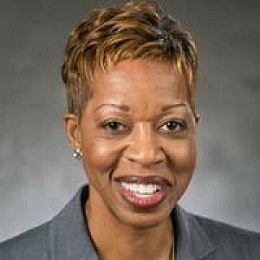The number of women in leadership positions at Duke University will increase this fall after it was announced that seven of the university’s 10 deans will be female.
Originally, eight deans were set to head their respective schools, but the divinity dean stepped down this month and was replaced by a male faculty member.
 Dr. Valerie S. Ashby
Dr. Valerie S. Ashby“Duke is really setting a standard for other colleges and universities in terms of diversifying the leadership of higher education,” said Duke alumna Carolyn Stefanco, who also is president of the College of Saint Rose in New York.
The female deans include School of Law Dean Karen L. “Kerry” Abrams, Trinity College of Arts and Sciences Dean Dr. Valerie S. Ashby, School of Nursing Dean Dr. Marion E. Broome, Sanford School of Public Policy Dean Dr. Judith Kelley, School of Medicine Dean Dr. Mary E. Klotman, Graduate School Dean Dr. Paula D. McClain and Nicholas School of the Environment Dean Dr. Toddi Steelman.
“What is really quite lovely about [the high number of women] is that we have a diverse group of thinkers on issues that are really important in higher education,” said Ashby, who along with McClain is African-American. “Even though there are several women, there are still multiple perspectives within that group of women.”
According to Duke Today, 65 percent of Duke University and Duke University Health System employees are women, compared to the national average of 46.9 percent. Additionally, Duke ranked 159th on the Forbes 2018 list for America’s Best Employers for Women.
“We want the very best faculty that we are adding to our departments,” said Ashby. “And if everybody is of the like mindset, experience and background, that cannot be the best that we can do.”
Across the United States, roughly half of higher education administrators are women. However, they make up only 30 percent of top executive positions, according to a College and University Professional Association for Human Resources (CUPA-HR) report.
A trend in higher education is that a majority of college students and graduates are women. However, a relatively small number of women are on the administrative ladder.
As part of an effort to increase the number of women in executive administrative positions in higher education such as university presidencies, the American Council on Education (ACE) created “Moving the Needle.” The initiative raises awareness through programs, research and resources, according to ACE officials.
“I believe firmly that when there’s more than one [woman in power], it shows a range of who we are as women and the different ways in which we embrace leadership,” said Stefanco.
Due to her own experiences, Stefanco has found that women in leadership become role models for other women. The first female dean of Trinity College of Arts and Sciences at Duke, Dr. Ernestine Friedl, was a role model for Stefanco while she was in school.
“She played a pretty instrumental role in my life as a young graduate student,” said Stefanco. “She had a really big impact on me. I believe that by having seven of the 10 deans be women, those women are going to have an impact on women in faculty, mid-level administrators, graduate students and undergraduate students.”
Many institutions across the country are focused on increasing faculty diversity in terms of gender and race. For example, for the first time in its history, Harvard University will have four of its schools led at the same time by African-American women, the Harvard Crimson reported.
According to Stefanco, in order to increase gender equity in higher education, it is important to have a diverse search committee and an institution that supports professional development.
“Leaders need to clearly articulate diversity goals and hold people accountable in achieving them,” said Stefanco. “Duke is showing excellence in action and not just in words.”
Additionally, Stefanco said, leadership must be authentic.
“We help those who might follow our paths to better know what it’s going to be like if we are willing to reveal our struggles and our setbacks as well as our successes, so that we are seen by people as full human beings,” said Stefanco.
Sarah Wood can be reached at [email protected].















